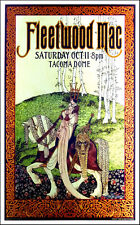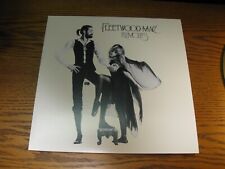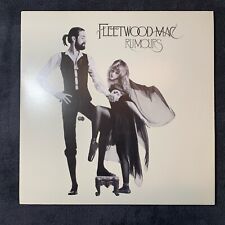|
Washington Post, November 23, 1979 Laid end to end, they'd stretch from New York to Los Angeles, as the World Book used to say. It's 14 times "platinum," and into a whole new vein of global commercialism. And that's how many copies of "Runmours" Fleetwood Mac sold a couple of years back, becoming the most visible overachievers of the music industry. The most likely not to succeed themselves.
Now comes "Tusk," as long-anticipated as the Kennedy campaign. Gloriously produced in digital precision, redolent of relevance. Absolutely strudded with Fleetwood Mack trademarks. The dilettante's delight.
Hear Lindsay Buckingham record his own multu-track song at home just like ToddRundgren used to do. Feel John McVie's bass turn your chest wall into a walking woofer. See Stevie Nicks preparing to turn "Sisters of the Moon" into a mystical stage persona. Sort of Son of "Rhiannon."
The fact is, "Tusk" is, by and large, boring. Pretty, but dumb.
Surely Nicks doesn't think she has invented a striking new phase when she sings about "drowning in the sea of love." Christine McVie, who once knew the knack of turning three basic chords into attractive little ballads, is still at it, only now she's writing three basic chords. And Mick Fleetwood keeps drumming, and John McVie keeps thumping, and Lindsay Buckingham keeps polishing the production tapes. . . it's like musical marzipan.
Only once does that other-worldly witch-woman Stevie Nicks sounds truly alluring and that's when she reads a dangerously familiar phrase: You feel good; I said, it's funny that you understood. I knew that you would, 'Cause when you were good You we're very, very good . But having that Charybdis of cliche like a seasoned actor, she promptly falls down and begins emoting like a wind-up doll: I've never been a calm blue sea, I've always been a storm .
The biggest disappointments are Buckingham's songs, which were among the best and most eccentric numbers on "Rumours." Those quicksilver changes of mood and rythm, and the unpredictability of songs like "Never Going Back Again" and "You Can Go Your Own Way" and stunningly absent from this double album (which Buckingham nevertheless dominated, having written nine of the 20 songs).
The one really unique and fascinating number is the title cut (which is also the radio single), and what's most interesting about it is its ambiguities. Why use the USC Trojan Marching Band to supply a roaring white-noise effect and overdub it onto a plain -- elliptically plain -- song? Is this "Sgt. Pepper" revisited? And which of the many wonderful Freudian possibilities explains the title itself?
You wanna look at Stevie Nicks? Go to the Cap Centre. You wanna know why "Rumours" sold 14 million copies? Buy "Rumours."
We all know this has been a busy time for Fleetwood Mac. Christine traipsing around behind the Beach Boys tour to be with Dennis Wilson, Stevie Nicks warbling with Kenny Loggins, Buckingham getting his hair cut -- these things intrude. Maybe they just didn't notice they were writing shoddy songs. Maybe Buckingham was so excited by the developments in digital-laser recording, he didn't care what the base material was like. Maybe by the next album, the novelty will have worn off. But this -- this is all second-hand news.
|









